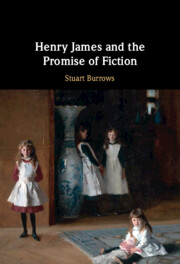
-
Select format
-
- Publisher:
- Cambridge University Press
- Publication date:
- October 2023
- November 2023
- ISBN:
- 9781009419710
- 9781009419697
- Dimensions:
- (229 x 152 mm)
- Weight & Pages:
- 0.49kg, 232 Pages
- Dimensions:
- Weight & Pages:
You may already have access via personal or institutional login
Book description
What is the relation between the novel and ethical thought? Henry James and the Promise of Fiction argues that the answer to this question lies not in the content of a work of fiction but in its form. Stuart Burrows explores the relationship between James's ethical vision and his densely metaphorical style, his experiments with narrative time, and his radical reimagining of perspective. Each chapter takes as its starting point a different aspect of an issue at the heart of moral philosophy: the act of promising. Engaging with a range of moral philosophers and literary theorists, most notably David Hume, Friedrich Nietzsche, Paul Ricoeur, and Jacques Derrida, Henry James and the Promise of Fiction argues that James's formal experimentation represents a significant contribution to ethical thought in its own right.
Contents
Metrics
Full text views
Full text views help Loading metrics...
Loading metrics...
* Views captured on Cambridge Core between #date#. This data will be updated every 24 hours.
Usage data cannot currently be displayed.
Accessibility standard: Unknown
Why this information is here
This section outlines the accessibility features of this content - including support for screen readers, full keyboard navigation and high-contrast display options. This may not be relevant for you.
Accessibility Information
Accessibility compliance for the PDF of this book is currently unknown and may be updated in the future.

